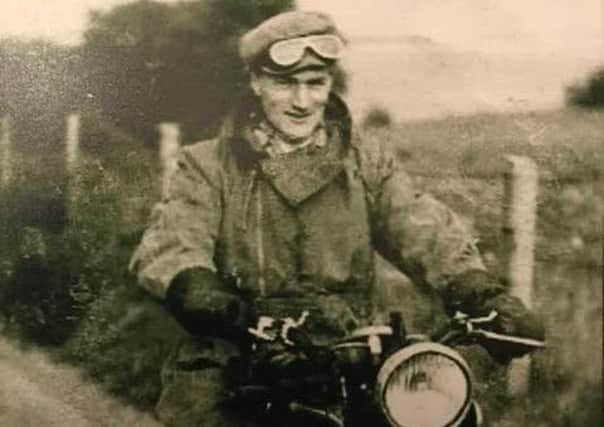Obituary: Heinz Voigt, financial director


Heinz Voigt’s circuitous journey to a long and fulfilling life in Scotland began in brutal circumstances on the battlefields of western France in 1944 – set in train by an American’s grenade.
Hiding in a pile of brushwood during a bombardment, the teenage conscript from Saxony thought he had dodged an approaching Allied tank and was intent on making it back to his own lines. But his position was engulfed by an enormous explosion as the ammunition, thrown by a passing American soldier, detonated above his head.
Advertisement
Hide AdAdvertisement
Hide AdA blizzard of shrapnel badly wounded the 19-year-old in the neck, arms and foot and left him bleeding from a head injury where a shard of flying metal had pierced his helmet. For Voigt the fighting, if not the war, was now over. He was captured by the United States troops and taken prisoner.
He would spend the remainder of the Second World War being transported on a convoluted route from Brittany to Britain, from Glasgow to New York, Arizona, California, San Francisco and back across the Atlantic via Cuba to Liverpool. He finally ended up in Sutherland where, after working on a farm and declining repatriation, he became financial director of a Scottish newspaper and a British citizen who called the Highlands home.
Voigt had newly turned 14 and, like virtually all his peers, was a member of the Hitler Youth Movement when Germany invaded Poland, igniting almost six years of global conflict. Born in Reichstadt, not far from Dresden, to parents Ella and her husband Kurt Voigt, a carpenter, he was educated locally before embarking on an accountancy apprenticeship. That was shortened by the war and in 1942 he was drafted into technical support for the army, trained in Leipzig and then transferred to the army, stationed in the French town of Brest.
As Hitler continued his march across Europe, the teenager found himself posted to Brittany where he served on the front line as a radio operator. By the time he was wounded the Allies were gaining back ground. In the aftermath of the D-Day invasion the Americans were tasked with liberating Brittany but they faced fierce opposition and the battle for the region raged from August until October.
Voigt was captured during the Allied advance that cost an estimated 10,000 dead or injured American troops. Patched up at a field hospital where most of the shrapnel was removed from his wounds – one piece remained lodged in his foot for the rest of his life – the young German soldier was then transported to the coast and across the Channel to Britain, taken north to Glasgow and packed off on a troop ship across the Atlantic to New York.
Once provided with a new American black uniform, emblazoned on the back with the letters POW, he then spent five days travelling across the United States in a crowded train compartment with fellow prisoners until they reached Arizona. It was June and blisteringly hot but the barracks, with their showers and other facilities, were a luxury to the POWs.
Many years later, interviewed for RB Macleod’s book on immigrants to the Highlands and Islands, he acknowledged: “When I think about it now, I was lucky to be captured by the Yanks – best of equipment and no shortage of food or nothing!”
Later he was moved to California to work in agriculture, picking cotton – a gruelling job working to quotas, filling 6ft long bags – and harvesting peaches for the Del Monte food firm.
Advertisement
Hide AdAdvertisement
Hide AdWhen the war eventually ended he was sent back to Britain by sea from San Francisco, sailing through the Panama Canal, via Cuba, landing at Liverpool.
Having been told he was going home, he expected to be released but was unaware that he was being transferred to Britain to be put to work. He went by train to Perth and a transit camp at Comrie before heading for Dingwall and Brahan Castle. From there he was among a number of former POWs sent to work at Kirkton Farm, Golspie, where they were billeted in Nissan huts. He also worked at a farm near Fearn where there was another camp.
He was finally discharged from the army in December 1948 and got the chance to be repatriated but his home in Saxony was now in part of Germany under Soviet occupation and the prospect of life there was grim.
He decided to stay on for another year – a move that turned into more than half a century – and did not see his family back home in Germany for a further 20 years.
After a spell working for a farmer in Dornoch he applied for a job as a bookkeeper for the Northern Times. He began with the company in 1950 and stayed for 41 years, retiring in 1991 as financial director.
Praised for his frugality, reliability and readiness to put the company first, the management maintained that had it not been for his scrupulous honesty, hard work and loyalty, the paper would not have survived many of the difficult times it experienced during those years.
Meanwhile he became a naturalised British citizen in 1963 and embraced life in Scotland, particularly the great outdoors. He went hill walking all over the north and west coasts, enjoyed hill climbing, sailing, skiing, cycling and motorbiking. In retirement he enjoyed woodturning and crafting rustic wooden items, including garden furniture and birdhouses. Passionate about the natural world, he also helped to maintain Golspie’s Big Burn woodland walk.
He also found personal happiness in Scotland in two long marriages, each lasting 34 years, firstly to Isabella with whom he had two children, and latterly to Sheila who survives him along with his sister Helga, his daughter Elizabeth, son Heinz and their extended families.
ALISON SHAW